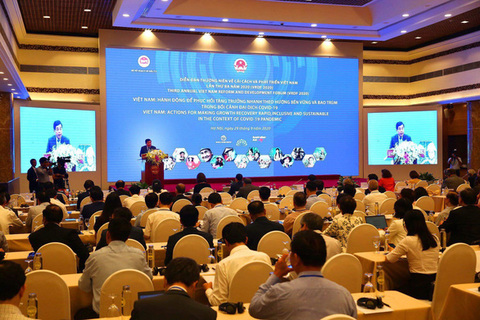Minister of Planning and Investment Nguyen Chi Dung has said.
 |
|
Minister of Planning and Investment Nguyen Chi Dung speaks at the forum.
|
These consultations are extremely important to the country’s development as it is facing trade tensions between major global partners and internal constraints of the economy that make the growth rate slow and heavily dependent on some capital sources and cheap labour, he added.
Dung was speaking at the third annual Viet Nam reform and development forum (VRDF 2020) held online in Ha Noi on Tuesday.
He said in 2021-25, Viet Nam will focus on solutions to promote growth towards sustainable development amid the impact of the COVID-19 pandemic.
“Viet Nam will strive to become a country with high middle-income by 2030,” Dung said.
He said Viet Nam had achieved success in the containment of the COVID-19 pandemic and GDP had continued to grow, but the outbreak had affected the whole economy.
“Many businesses have stopped operation, and workers have lost their jobs, affecting the general development of the economy. Viet Nam’s economic losses are also caused by the decline of global trade because it is an open economy and its growth is heavily dependent on exports and trade exchange with countries in the region and the world,” Dung said.
From the beginning of the year until now, Viet Nam has reached a trade surplus of US$12 billion and attracted $20 billion of foreign direct investment (FDI).
Carolyn Turk, the World Bank Country Director for Viet Nam, said the forum aimed to assess the Vietnamese economy’s progress in the context of COVID-19 pandemic, and discuss how Viet Nam can find and harness opportunities from two mega-trends emerging from COVID-19, namely the shifts in the global trade and investment system and the development of the contact-free economy.
She said the world was changing and Viet Nam had changed. While other countries were now struggling, Viet Nam had been able to contain the pandemic with a limited number of deaths and infections.
“The Government’s exceptional management of the health crisis has been well recognised internationally and was again effective in containing the second wave in Da Nang in recent weeks,” she said.
Turk expressed concerns about the short- and long-term impact of COVID-19, including new sources of quality FDI and moving up the value chain.
“For me, and I hope that you agree with me, the challenge for Viet Nam is not necessarily to get more FDI but to maximise its impact on the local economy through transfers of technology and competencies,” Turk said.
She said the country had already embarked on digital transformation, but more could and should be done. The Government must step up by pushing its national digital ID programme and the development of Government service portals at all levels, databases and information sharing.
Regulations to create an eco-system for digital payments and financial inclusion would be critical foundations for the development of the contact-free economy, she added.
“Viet Nam has a good track record in implementing several of its policy priorities, but its performance has been uneven in other areas.
"As Viet Nam moves into the implementation of its new development strategy for the years 2021-30, the good management of the COVID-19 crisis can be used as a model for replication in many policy areas that are critical for Viet Nam to meet its development aspiration,” Turk said.
“Like for COVID-19, effective implementation of policy reforms in the areas of global trade and digital economy will require commitment, both at the individual and collective levels, as well as capacities and motivation to co-ordinate, experiment and innovate.”
Sharing ideas at the forum, Dr Jacques Morrset, a World Bank specialist, said COVID-19 was a game-changer as it provided a unique opportunity for Viet Nam.
“Viet Nam has been doing well but it can do better," he said.
He said that World Trade Organization (WTO) reports showed that global trade was slowing with an estimated decrease of 13-35 per cent in 2020. Meanwhile, the UN estimated that FDI would decline 5-15 per cent worldwide in 2020.
He said this still created new opportunities for Viet Nam.
“The risk of supply chain disruptions may accelerate the shift of several multinationals from of China to Viet Nam, which was already a pre-COVID-19 trend due to rising labour costs in China and trade tensions between US and China.”
“New sense of urgency can lead to acceleration of reforms on the domestic front, especially in digitalisation and better business environment, making Viet Nam more attractive. Regional trade agreements create new opportunities when barriers are rising in the rest of the world,” Jacques said.
“Viet Nam has been smart because it is dealing so well with the COVID-19 crisis. The country is one of the most open economies in the world in terms of merchandise trade.”
Jacques said the Vietnamese economy was 1.5 times and five times more open than Thailand and China, respectively. In addition, pre-COVID-19 Viet Nam was already a proven FDI destination in ASEAN, with massive FDI inflows at 2 per cent of GDP more than Malaysia and Thailand, and global value chains account for 66 per cent of the country’s total trade.
However, he said the country’s domestic content was still low.
He said if Viet Nam wanted to participate deeply in the value chain, it needed high-quality human resources, good infrastructure, new technologies and to open up services, with service development the driving force for other economic sectors.
Attending the forum were leaders and experts from the Government, ministries, agencies, World Bank and international organisations.
The forum will help with the development of the 2021-30 Socio-Economic Development Strategy and the five-year Socio-Economic Development Plan 2021-25. – VNS

Vietnam has room to climb up global value chains
According to experts, to participate more deeply in the global value chain, Vietnam must be able to do sophisticated steps. Meanwhile, Vietnam's GDP will also increase faster.